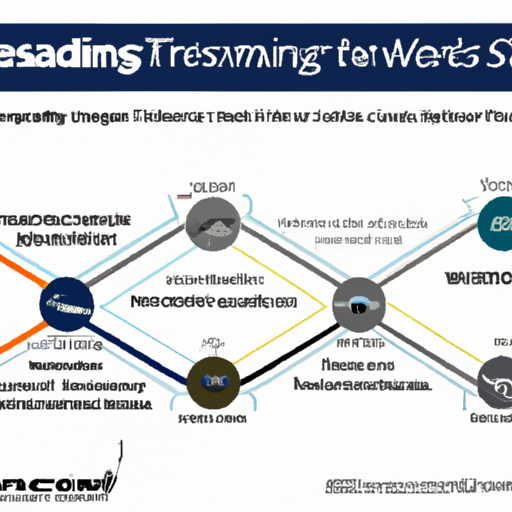What Are Some Current Trends In The Sport And Event Industry?
Live Streaming of Sports date on the latest happenings in the sport and event industry? Curious about the current trends that are shaping the landscape? Look no further! In this article, we will explore some of the exciting developments and emerging trends in the sport and event industry. From virtual experiences and personalized fan engagement to sustainability initiatives and innovative event formats, this article will give you a glimpse into the exciting world of sports and events in today’s ever-evolving industry. So, get ready to discover what’s hot and happening right now!
Table of Contents
Technology Trends in the Sport and Event Industry
Virtual Reality (VR) and Augmented Reality (AR)
Virtual Reality (VR) and Augmented Reality (AR) are revolutionizing the sports and event industry by providing immersive and interactive experiences for fans. With VR, fans can feel like they are right in the middle of the action, whether it’s sitting courtside at a basketball game or being on the pitch during a soccer match. AR, on the other hand, enhances the real-world environment by overlaying digital content, such as player stats or real-time information, onto the physical space. These technologies have the potential to transform the way fans engage with sports and events, creating a more captivating and personalized experience.
Artificial Intelligence (AI) in Sports
Artificial Intelligence (AI) is increasingly being used in the sports industry to analyze vast amounts of data and generate valuable insights. AI-powered algorithms can analyze player performance, predict game outcomes, and even help coaches develop strategies. Athletes can also benefit from AI-based training programs that provide personalized recommendations for improvement. Additionally, AI can automate various tasks, such as ticketing and customer service, optimizing operational efficiency. The integration of AI in sports is revolutionizing the way teams, athletes, and fans interact with the game.
Smart Stadiums and Venues
Smart stadiums and venues are transforming the fan experience by leveraging cutting-edge technologies. These venues are equipped with advanced connectivity, allowing fans to access high-speed Wi-Fi, engage in interactive activities, and access real-time information during events. Smart stadiums also incorporate features such as digital signage, mobile ticketing, and cashless transactions, streamlining the entire event experience. With the integration of Internet of Things (IoT) devices, these venues can gather data on everything from crowd behavior to environmental conditions, enabling better resource management and enhanced security.
E-Sports and Competitive Gaming
E-Sports, or competitive video gaming, has exploded in popularity in recent years, attracting a massive global audience. E-Sports events now fill arenas and stadiums worldwide, with millions of viewers tuning in online to watch their favorite teams compete. The growth of E-Sports has even led to the creation of professional leagues, lucrative sponsorship deals, and dedicated gaming arenas. E-Sports offers a unique opportunity for brands to engage with a large and highly passionate fanbase, opening up new avenues for marketing and sponsorship in the sport and event industry.
Wearable Technology in Sports and Events
Wearable technology, such as fitness trackers, smartwatches, and biometric sensors, is revolutionizing the way athletes train and fans engage with sports and events. These devices can track vital signs, performance metrics, and provide real-time feedback to athletes, helping optimize their training and performance. For fans, wearable technology offers an interactive experience, allowing them to track their favorite athletes’ performance, receive personalized content, and enhance their overall event experience. The integration of wearable technology in sports and events is bridging the gap between athletes and fans, creating a more connected and immersive environment.
Event Management Trends
Sustainability and Green Events
In recent years, there has been a growing emphasis on sustainability and green practices in the event industry. Event organizers are adopting eco-friendly initiatives such as recycling programs, reducing waste, and using renewable energy sources. Green events prioritize the use of sustainable materials, minimize carbon emissions, and implement environmentally friendly practices. By incorporating sustainability into event management, organizers contribute to the preservation of the environment and create a positive impact on the community.
Experiential Events
Experiential events focus on creating memorable and immersive experiences for attendees. These events go beyond traditional conferences or exhibitions and aim to engage all the senses and evoke emotions. By incorporating interactive elements, creative installations, and unique experiences, experiential events provide attendees with a deeper connection and lasting memories. Whether it is through virtual reality experiences, interactive art installations, or hands-on workshops, experiential events captivate and delight attendees, making them a popular trend in the industry.
Multi-sensory Experiences
Similar to experiential events, multi-sensory experiences aim to engage multiple senses to create a more immersive event environment. By integrating various sensory elements, such as sound, light, touch, and scent, event organizers can create a multi-dimensional experience that resonates with attendees on a deeper level. Examples include using scent diffusers to create a specific ambiance, incorporating immersive lighting effects, and providing interactive touchpoints throughout the event space. Multi-sensory experiences cater to attendees’ senses, enhancing their overall event experience and leaving a lasting impression.
Event Personalization and Customization
Personalization and customization have become increasingly important in the event industry, as attendees seek tailored experiences that cater to their individual preferences. Event organizers leverage technology to collect data and insights on attendees, enabling them to create personalized event experiences. From customized agendas and tailored recommendations to personalized networking opportunities, event personalization ensures that attendees feel valued and engaged throughout the event. This trend is driven by the desire to deliver unique and meaningful experiences that leave a lasting impact on attendees.
Marketing and Sponsorship Trends
Influencer Marketing in the Sport and Event Industry
Influencer marketing has become a powerful tool for reaching and engaging with target audiences in the sport and event industry. Brands collaborate with influential individuals, such as athletes, sports personalities, or event organizers, to promote their products or services. These influencers have a dedicated following and can effectively endorse brands through various channels, including social media, blogs, and live events. Influencer marketing allows brands to tap into a specific audience, build credibility, and create authentic connections, driving brand awareness and engagement.
Data-driven Marketing Strategies
Data-driven marketing strategies utilize data and analytics to inform decision-making and optimize marketing campaigns. By collecting and analyzing data on consumer behavior, preferences, and demographics, marketers can create targeted campaigns that resonate with their audience. Data-driven marketing allows for personalized messaging, precise targeting, and the ability to measure campaign effectiveness. In the sport and event industry, data-driven marketing strategies help brands understand fan preferences, optimize ticket sales, and enhance overall fan engagement.
Social Media Activation
Social media activation involves leveraging social media platforms to engage with fans, create brand awareness, and amplify event experiences. Event organizers use platforms such as Facebook, Instagram, Twitter, and YouTube to share event highlights, engage with followers, and generate user-generated content. Social media activation strategies can include interactive contests, live streaming of events, behind-the-scenes content, and influencer partnerships. By utilizing social media platforms, brands and event organizers can connect with fans in real-time, extend their reach, and create a sense of community around their events.
Branded Content and Storytelling
Branded content and storytelling is an effective marketing strategy that involves creating compelling narratives around a brand or event. Instead of directly promoting a product or service, brands create valuable and engaging content that resonates with their target audience. With storytelling, brands can emotionally connect with fans, share behind-the-scenes stories, and create a sense of authenticity. Branded content can take various forms, such as blog posts, videos, podcasts, or interactive experiences. This marketing trend allows brands to build trust, establish a strong brand identity, and foster long-term fan engagement.
Virtual Sponsorship and Digital Advertising
Virtual sponsorship and digital advertising have gained prominence in the sport and event industry, particularly with the rise of virtual and hybrid events. Brands can leverage virtual platforms to display digital signage, promote their products or services, and engage with attendees. Virtual sponsorship offers unique opportunities for brand exposure, enabling sponsors to reach a global audience without physical limitations. Additionally, digital advertising allows for precise targeting, real-time analytics, and the ability to measure return on investment (ROI). Virtual sponsorship and digital advertising are shaping the future of marketing in the sport and event industry.

Fan Engagement and Experience Trends
Fan-driven Experiences
Fan-driven experiences focus on empowering fans by allowing them to actively participate and contribute to the event experience. Instead of being passive spectators, fans are encouraged to engage, interact, and shape the outcome of the event. Fan-driven experiences can include elements such as fan voting, crowd participation, and interactive challenges. This trend recognizes the importance of fan involvement and creates a sense of ownership, fostering a deeper connection between fans and the event.
Fan Relationship Management
Fan relationship management involves nurturing and cultivating relationships with fans to create long-term loyalty and advocacy. Through various touchpoints, such as personalized communications, exclusive content, and loyalty programs, event organizers and brands can foster a sense of belonging and appreciation among fans. Fan relationship management strategies take into account individual preferences, demographics, and behavior to provide tailored experiences that strengthen the fan-business relationship. By prioritizing fan relationships, brands and event organizers can create a dedicated and passionate fan base.
Gamification in Sports and Events
Gamification is the integration of game mechanics and elements into non-gaming contexts, such as sports and events. By incorporating elements such as points, rewards, leaderboards, and challenges, gamification enhances fan engagement and creates a sense of competition and fun. Gamification can be applied in various ways, from interactive fan experiences and trivia challenges to virtual scavenger hunts and online competitions. This trend leverages the innate human desire for competition and achievement, providing fans with an interactive and immersive event experience.
Interactive and Immersive Experiences
Interactive and immersive experiences allow fans to actively engage with the event environment and go beyond traditional spectatorship. These experiences can involve interactive installations, virtual reality simulations, or AR-enhanced environments. By blurring the line between the physical and digital realms, interactive and immersive experiences capture fans’ attention, spark their imagination, and create memorable moments. This trend enhances fan engagement, encourages social sharing, and elevates the overall event experience.
Safety and Security Trends
Enhanced Security Measures
Ensuring the safety and security of attendees is a top priority for event organizers. Enhanced security measures, such as advanced surveillance systems, facial recognition technology, and entry screening, are being implemented to prevent potential threats. These measures not only deter security risks but also provide attendees with peace of mind, allowing them to fully enjoy the event experience. As technology continues to advance, event organizers are leveraging cutting-edge solutions to proactively address safety concerns.
Safeguarding Fans and Participants
In addition to general security measures, event organizers are implementing specific strategies to safeguard fans and participants. This includes creating designated safe zones, providing medical professionals on-site, and offering clear evacuation protocols. Crowd management techniques and advanced communication systems are also utilized to ensure the safety of attendees in case of emergencies. By prioritizing the well-being of fans and participants, event organizers create an environment that fosters trust and confidence.
Health and Safety Protocols
With the ongoing COVID-19 pandemic, health and safety protocols have become crucial in the sport and event industry. Event organizers are implementing measures such as temperature screenings, mandatory mask-wearing, increased sanitation protocols, and social distancing guidelines. These protocols aim to minimize the risk of virus transmission and ensure the well-being of attendees. As the situation evolves, event organizers will continue to adapt and implement the necessary health and safety measures to protect everyone involved.
Sustainability Trends
Reducing Environmental Impact
Reducing the environmental impact of events has become a key focus for event organizers. This includes minimizing waste generation, promoting recycling, and utilizing sustainable materials. Event organizers are also evaluating energy consumption and implementing energy-efficient practices. By reducing their environmental footprint, event organizers demonstrate their commitment to sustainability and contribute to a healthier planet.
Carbon Neutrality and Zero Waste Events
The concept of carbon neutrality and zero waste events involves offsetting the carbon emissions and aiming to produce zero waste throughout the event. Event organizers are partnering with carbon offset programs, implementing waste management strategies, and promoting recycling initiatives. Through careful planning and collaboration, event organizers aspire to create events that have a minimal impact on the environment.
Implementation of Sustainable Practices
Event organizers are actively embracing sustainable practices throughout the planning and execution of events. This includes using environmentally friendly transportation options, sourcing local and organic food, and prioritizing sustainable event design. By adopting sustainable practices, event organizers not only contribute to a greener future but also inspire attendees to make conscious choices and live more sustainably.
Data and Analytics Trends
Predictive Analytics in Sports
Predictive analytics utilizes historical data and statistical models to forecast future outcomes or trends. In sports, predictive analytics can be used to predict player performance, game results, or even identify injury risk. By analyzing large datasets, predictive analytics algorithms can identify patterns and make accurate predictions that assist coaches, athletes, and sports organizations in making informed decisions. This trend empowers teams and athletes to gain a competitive edge by leveraging the power of data.
Real-time Data Tracking and Analysis
Real-time data tracking and analysis enable teams, athletes, and event organizers to monitor performance metrics instantaneously. With the help of wearable technology and IoT devices, real-time data on biometrics, player movements, and environmental conditions can be collected and analyzed in real-time. This information allows for immediate adjustments, informed decision-making, and performance optimization. Real-time data tracking and analysis revolutionize how sports are analyzed, providing valuable insights that can help uncover strategies and improve overall performance.
Fan Data Utilization
In the era of digital engagement, fan data has become a valuable asset for brands and event organizers. By collecting data on fan behavior, preferences, and demographics, event organizers can create targeted marketing campaigns, tailor event experiences, and optimize fan engagement. Fan data utilization allows event organizers and brands to better understand their audience, personalize experiences, and build long-term relationships based on insights and analytics.
Globalization Trends
Internationalization of Sports and Events
Sports and events are increasingly expanding their reach beyond national borders and venturing into international markets. Major sporting leagues, such as the NBA and the English Premier League, have actively pursued global expansion by hosting games and events in different countries. This trend not only strengthens the global fan base but also creates opportunities for cultural exchange and economic growth. The internationalization of sports and events presents new challenges and exciting prospects for players, teams, and event organizers alike.
Expansion into Emerging Markets
Emerging markets, such as China, India, and Brazil, present vast opportunities for the sport and event industry. With increasing disposable incomes and a growing interest in sports and entertainment, these markets have become attractive destinations for event organizers and brands. Expansion into emerging markets allows for the diversification of revenue streams, exposure to new audiences, and the establishment of long-term partnerships. As these markets continue to evolve and grow, the sport and event industry will seize the opportunity to connect with new fan bases and deliver memorable experiences.
Event Streaming and Broadcasting Trends
Live Streaming of Sports and Events
The rise of live streaming platforms has significantly impacted the way sports and events are consumed. Fans no longer need to be physically present at the venue to enjoy their favorite games or events. Live streaming allows fans to watch in real-time from the comfort of their homes or on the go, offering convenience and accessibility. Event organizers and broadcasters are adapting to this trend by providing high-quality live streaming services, interactive features, and exclusive content that cater to the online audience.
Virtual Attendance and Remote Viewing
Virtual attendance and remote viewing technologies provide an alternative way for fans to experience sports and events. Through virtual reality or 360-degree video, fans can immerse themselves in the event environment and feel as if they are actually there. Virtual attendance also allows fans to interact with each other and access additional content, such as player interviews or backstage footage. This trend enables fans from around the world to participate and connect with events, regardless of geographical constraints.
Post-pandemic Recovery Trends
Adapting to Hybrid and Virtual Events
The COVID-19 pandemic has accelerated the adoption of hybrid and virtual events. To navigate through the restrictions and ensure the continuity of events, event organizers have embraced digital platforms to host virtual conferences, exhibitions, and even sports competitions. Hybrid events combine in-person and virtual elements to provide a seamless experience for both physical and remote attendees. This trend enables event organizers to reach a broader audience, overcome logistical challenges, and adapt to the evolving landscape of event planning.
Contactless Experiences
In light of health and safety concerns, contactless experiences have become a priority in the post-pandemic era. Event organizers are implementing technologies such as mobile ticketing, contactless payments, and QR codes for seamless entry and transactions. Attendees can now simply scan their devices and access the event without the need for physical contact. By prioritizing contactless experiences, event organizers ensure the safety and well-being of attendees while providing a streamlined and hassle-free event experience.
Health and Hygiene Measures
Post-pandemic recovery trends emphasize the implementation of comprehensive health and hygiene measures. This includes increased sanitation protocols, hand sanitizing stations, and mandatory mask-wearing. Event organizers are also adopting strategies such as reduced capacity, social distancing guidelines, and health screenings to minimize the risk of virus transmission. Health and hygiene measures reassure attendees that their well-being is a top priority and create an environment that prioritizes safety.
As the sport and event industry continues to evolve, these trends shape the future of fan engagement, event management, marketing, and overall event experiences. The integration of technology, sustainability practices, data analytics, and global expansion present exciting opportunities for athletes, teams, event organizers, and brands. By embracing these trends, the sport and event industry can create transformative experiences that captivate audiences and leave a lasting impact.

